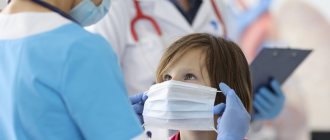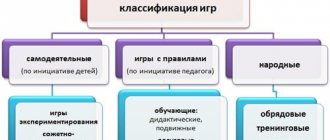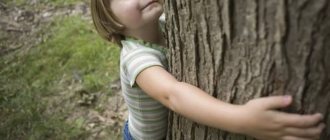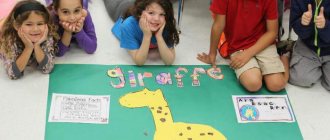Non-traditional forms of organizing children's activities
| Presentation of an object, phenomenon, event, fact | Description, disclosure of the role of an object, social purpose in a person’s life, participation in social relationships. |
| Sociodrama | Plot-role-playing game, predetermined by the position of the main characters; a situation of choice on which the course of life and socio-psychological relationships, awareness of oneself in the structure of social relations depend. |
| Project protection | The ability to project changes in reality in the name of improving life, correlating personal interests with public ones, proposing new ideas for solving life problems. |
| Philosophical table | Collective work to find the social significance and personal meaning of the phenomenon of life - “Freedom and Duty”, “Man and Nature”, etc. |
| Tea party | It has great power, creates a special psychological atmosphere, softens mutual relationships, and liberates. |
| "Toughie" | Solving difficult issues in life together with a group, confidential conversation based on good relationships. |
| Day of good surprises | An exercise in the ability to show signs of attention and bring joy to people. |
| Envelope of questions | Free exchange of opinions on various topics in a friendly atmosphere. |
| Graduation ring | Report from graduates of creative teams, analysis of the past, plans for the future; creating an atmosphere of friendship and mutual understanding; developing the ability to interact with people. |
The various forms of educational activities are based on common characteristics:
• each educational lesson has a goal, specific content, and certain methods of organizing educational and pedagogical activities;
• any training session has a certain structure, that is, it consists of separate interconnected stages;
• the construction of a training session is carried out according to a certain logic, depending on its purpose and type.
children's activities in the educational process
| Lecture | Oral presentation of a topic that develops the creative thinking activity of students |
| Seminar | Form of group classes in the form of discussion of prepared messages and reports under the guidance of a teacher; forms analytical thinking, reflects the intensity of independent work, develops public speaking skills |
| Discussion | Comprehensive public discussion, consideration of a controversial issue, a complex problem; expands knowledge through information exchange, develops critical judgment skills and defending one’s point of view |
| Conference | Meeting, meeting of representatives of various organizations to discuss and resolve any issues; instills the skills of open discussion of the results of their activities |
| Excursion | A collective hike or trip for the purpose of inspection or acquaintance with any attraction; enriches sensory perception and visual representations |
| Expedition | Group trip with a special task; solves a complex of diverse tasks for organizing effective practice in the process of obtaining specialized results outside the classroom |
| Hiking trip | Movement of a group of people for a specific purpose; realizes the goals of knowledge, education, health improvement, physical and sports development |
| Educational game | An activity that has certain rules and serves for learning new things, relaxation and pleasure; characterized by modeling life processes in a developing situation |
Towards non-traditional forms
training sessions include: • integrated classes based on interdisciplinary connections;
• competition classes: competitions, tournaments, quizzes, etc.;
• classes based on methods of social practice: reportage, interview, invention, commentary, auction, rally, benefit performance, oral journal, newspaper, etc.;
•classes based on non-traditional organization of educational material: •presentation, confession, etc.
• fantasy activities: fairy tale, surprise, adventure, etc.
• classes based on imitation of social activities: court, investigation, academic council, parliament, etc.
Let us characterize new forms of organizing students’ activities that have recently begun to be used both in school practice and in the practice of additional education.




